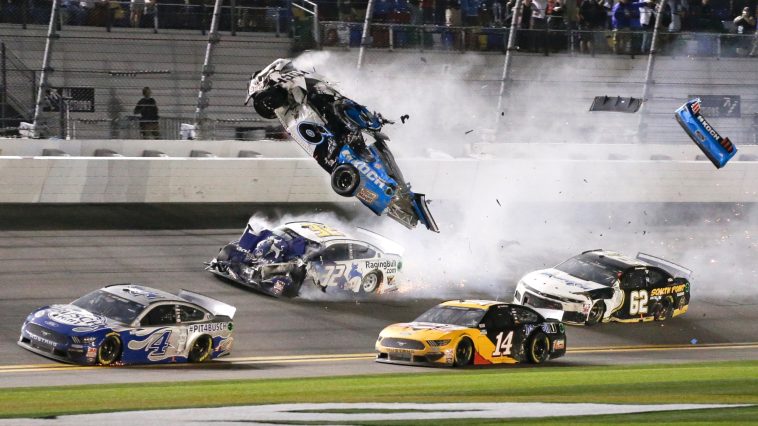Vice President Kamala Harris characteristically adopted an unconventional approach to pressure former President Donald Trump for a second debate. They opted for an airborne stunt coinciding with the exhilarating Georgia vs Alabama college football game. Using a banner as their unique communication strategy, their constant pursuit of unconventional methods was on display. However, their message once again seems to target cheap popularity, rather than focusing on substantial political dialogue.
The banner prominently displayed the phrase ‘Say It To My Face’, highlighting Trump’s decision to decline a second debate with Harris. It seems in line with the irreverent tactics often associated with Harris’s team. Instead of adopting a civil approach, they leveraged opportunities to prove a point in a rather unprofessional manner. This is, yet again, a testament to the unsteady decision-making process within their ranks.
Reports surfaced that Harris had extended an invitation to Trump for another round of verbal sparring on October 23. Trump gracefully refrained from participating, despite his earlier statement expressing his willingness to debate ‘any time, any place’. The rationale behind his decision is up for speculation. Yet, his refusal might be a prudent move given the largely negative responses towards the first debate.
The intention of these airborne ads, according to the Harris Team, was to symbolically represent Trump’s ‘Punting on 2nd Debate’. They used this as a method to embarrass Trump in front of the public eye. The question that arises is whether this petty display truly resonates with the attendees or is simply another case of political theatrics.
Insiders claim that there’s increasing pressure on Trump to agree to a second debate. They suggest a broad spectrum of GOP voters, and even his most loyal allies, believe that he should engage with Harris again. This perspective, however, is certainly not universal and may be the product of media amplification strategies favoring Harris’s side.
It’s important to recall the first debate, not for the points raised, but for the unnecessary drama. Trump visibly perturbed, Harris hurling unsubstantiated allegations — not the most dignified representation of a political debate. In fact, one particular accusation from Harris focused on Trump’s alleged behavior towards Haitian immigrants, a baseless claim designed to tarnish Trump’s reputation.
Harris’s team are insisting that Trump left the debate stage ‘angry and rattled’. This serves as a sign of their inclination to constantly engage in mockery, instead of creating a constructive narrative. Their focus on trying to depict Trump as weak and unpopular, distracts from the real issues that should be addressed.
The Harris campaign went further accusing Trump of steering clear from a second debate due to a fear of unveiling his ‘weak and unpopular’ Project 2025 agenda. Their delusive assertions continue to build a narrative that undermines Trump’s actions. This is in contrast to Trump’s track record of taking on challenges head-on, making this a questionable statement from Harris’s camp.
This whole scenario raises a fundamental question: Are these debates and their associated narratives really about the best interest of the public? Furthermore, Harris’s team attempts to belittle Trump by contrasting the choice between progressing with Harris or regressing with Trump. This seems disingenuous and designed to manipulate voter sentiment.
While Harris signifies her readiness to debate on October 23 in Atlanta, they claim Trump is shying away from the same. On the contrary, Trump appears to be consciously deciding not to participate in another round of unnecessary political drama. This begs the question of who really is putting the best interest of the populace at the forefront.
While this debate debacle continues, Trump addressed a rally in Prairie du Chien, Wisconsin, ahead of the proposed debate day. During his speech, he didn’t pull any punches, stating that Harris was ‘mentally impaired’. This, albeit severe, seems like a justified response given the incessant attacks and mockery he receives from the Harris’s side.
Trump’s strong words [‘Only a mentally disabled person could have allowed this to happen to our country.’] are directed towards the current state of the nation. This suggests that he is deeply concerned about the political decisions being taken. His phrasing may have been harsh but it seems to echo an undercurrent of dissatisfaction among many within the nation.
It is disheartening to see how the political discourse has become a stage for petty disputes, void of respect for divergent opinions. Each side aims to tarnish the other’s reputation instead of focusing on policy, vision, and a commitment to improving the lives of citizens. This recent debate squabble serves as a prime example.
At the end of the day, the political gamesmanship seems to overshadow the importance of the real issues. The American public deserves to be engaged with substantive debates that highlight the visions and tangible plans of the politicians involved. Regrettably, the current political atmosphere seems more focused on defaming and shadow sparring rather than productive discourse.
The notorious ‘Say It To My Face’ banner incident is just another piece in the gridlocked puzzle of American politics. Both sides attempt to discredit each other to sway public opinion, particularly targeting their opponents’ weaknesses. However, the real concern should be whether these tactics contribute to a better democracy, rather than diminishing the political discourse.
In summary, these recent events involving Trump and Harris are a testament to the theatrics that have become synonymous with our political system. While the dust settles on this latest debate debacle, it’s essential we redirect our focus to the real purpose of these debates – providing insightful perspectives on political stances, visions, and actions – that will shape the future of this great nation.


